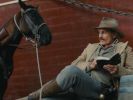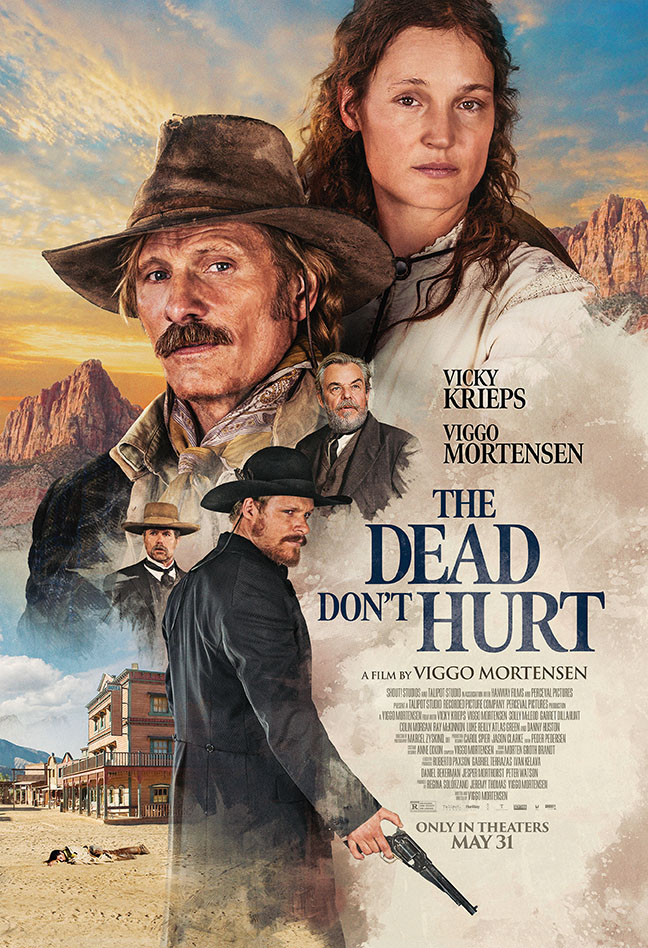Eye For Film >> Movies >> The Dead Don't Hurt (2023) Film Review

The Western was at one point a dominant mode of filmmaking, a lens, often a specific one, upon man and landscape. It fell out of fashion as tastes changed, as prices increased, as it became easier to turn men with no name into cops whose cannons were loose and whose posters made them eponymous protagonists. When there were wagon trains from Hollywood into bits of desert that were in their own way as memorable as Doctor Who's quarries outside London. There were efficiencies in scale and coat-tail.
Those days are gone now, but history has a way of repeating itself. Is it that it's cheaper to shoot remotely than ever before? That period detail can be achieved in one place and dressed digitally in another? That the stories to be told are made easier by a return to distance, to unreliable mails and sometimes-hijacked post-riders? The High Sierra rather than Wi-Fi, the emptiness of Manifest Destiny instead of urban paranoia.

That's a disservice to The Dead Don't Hurt, which amongst a sometimes disappointingly standard narrative asks questions of nationhood, of masculinity, of how we make places in the world and then find them. I say "sometimes disappointing" because its instigating incidents are frequent fare, a dead wife, an assault among others, and these are not new, indeed almost cliché. These old timbers are used well though, and are among my only issues. There's a moment dockside, a red-painted hull a large wooden metaphor behind the scene, where I found myself distracted by trying to determine how much a ship would be moving on the water, buffeted by tide and current and stevedores' tread. 'Hello' wasn't quite a greeting then, but it would work as a gentle exclamation. It's detail as distraction. These are the smallest things. What matters more is the couple. The boat behind Olsen, and Vivienne before.
Vicky Krieps is brilliant in an ensemble cast full of somewhat familiar faces, moving through difficult social and physical landscapes in a society that's polite, polyglot, or punctuated by violence. Viggo Mortenson is gunning for the same sort of multi-hyphenate as Robert Rodriguez or John Carpenter. Writing, directing, composing, acting, playing musical instruments, even supplying props. There's a repeated figure on horseback. Though they've an ever changing face their scabbard is filled with Anduril. Re-forged, The Flame of the West is emblematic.
Mythic weight, for one. A story well re-told. That Flame of the West was of Middle Earth and we are again in the midst of the Civil War. How Danes and Quebecois and Italians became Americans, and tellingly how those up the ladder a step or two before them tried to pull it up. The metallic clink on the score that indicates danger might be a gun, it might be a coin. Unkindnesses come variously clad, by the bullet or the business. A noirish cast to the plot is contrasted by Marcel Ziskind's camera, finding colour and sweep amongst the bleak.
For all that some small details are still nagging, others are a delight. In the litany of languages a conversation about a barn suggests different things to different ears. A discussion of a town that balances 'shit-hole' and 'honeypot' is more amusing if you know the latter was a slang term bomber crews used for the bucket used as the former. That's far and away in the future though, there are no masters of the air. "How was your war?" he's asked, having gone to see about it. Everyone in their own way fighting.
I know I mentioned the things I did not like but that is in part because so much elsewhere was so good. A structure that moves forward at different scales in two time periods is no small challenge, and achieving revelatory clarity in the process is both feat and treat. The performances of Krieps and Mortenson are laconic and light, despite the memories of the dead. At the end we see, briefly, 'The Raven's Daughter', and with Joan of Arc and more there's a hint of magic amongst the realism. Hessian sacks and hempen ropes, hangings as untidy as they are unjust, rent's due, the roses need watered.
As a debut feature for Mortenson behind the camera it speaks to craft and quality. Are there echoes of The Road, of A History Of Violence, of Eastern Promises? Yes. Is that a problem? Far from it. The Dead Don't Hurt does not suffer in comparison, and having mentioned Carpenter and Rodriguez, Cronenburg belongs in that list of auteurs by necessity, the efficiencies of enfant terrible. The Dead Don't Hurt is such that I am tempted to see it again, to revel in a small and human story in the sweep of a West both mythic and mundane. While Furiosa is a saga, here a lament. They can't make them like they used to, but they can do better. Here's proof.
Reviewed on: 19 Jun 2024

















